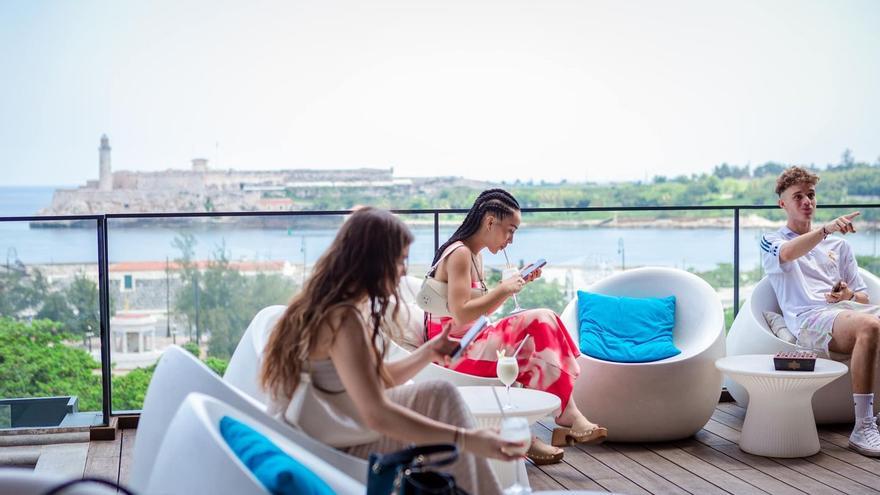
![]() 14ymedio, Havana, 20 July 2023 — The Spaniard Marina Rivera, who was one of the more than twenty influencers who arrived in Cuba this July to promote tourism, invited by the travel agency Enjoy Travel Group, published a video on her Tik Tok profile on Wednesday to respond to the accusations of “white-washing the dictatorship” by many of her followers and Cuban content creators.
14ymedio, Havana, 20 July 2023 — The Spaniard Marina Rivera, who was one of the more than twenty influencers who arrived in Cuba this July to promote tourism, invited by the travel agency Enjoy Travel Group, published a video on her Tik Tok profile on Wednesday to respond to the accusations of “white-washing the dictatorship” by many of her followers and Cuban content creators.
“I didn’t think this would be necessary, but let’s talk about Cuba,” the influencer begins her three-minute video in which she exposes, above all, that both she, the rest of the group and her agency had not been paid for the trip that was made to promote the recently inaugurated Barcelona-Havana flight. “We weren’t paid a euro for anything. They just invited us on the trip,” she says.
Rivera also explains that she is not to blame for the socioeconomic and political situations of the countries she visits and that many have a lack of “freedoms and rights and have horrible political situations, but that is not the fault of tourists.”
Marina Rivera also compared the Cuban regime to the Franco dictatorship: “In Spain we had 40 years of dictatorship, and some of us lived from tourism. It’s exactly the same in Cuba. People live from tourism. And thanks to all those tourists who came to Spain during the dictatorship, a lot of people were able to eat. We wanted to do the same thing through tourism to Cuba.”
“We enjoyed the Island and left money in local businesses,” concludes Rivera, who said that the group of influencers had distributed medicines, water, sweets and money among the people of Havana, and added: “We were not going to say this because we did it in a disinterested way. For example, the Twin Melody gave away 400 euros in cash to the street children.”
Some Cuban influencers, such as Claudia Tropiezos and Royniel2, have strongly criticized the visit of young Spaniards to Cuba, accusing them of “romanticizing a dictatorship.” They were joined by the Cuban Dina Star, who has lived in Madrid for two years, who, after publishing a video on the subject on YouTube, was invited to the Spanish program Todo es Mentira [It’s All a Lie]. This same program witnessed, during the July 2021 protests, how Cuban State Security arrived at the YouTuber’s residence in Havana to take her to the Zapata and C station while she broadcast live.
Diego Moreno, executive director of the talent agency Nickname, which represents the influencers who traveled to Cuba, was also invited to the program, broadcast on July 18.
Moreno explained that the influencers were invited by the travel agency Enjoy Travel Group, based in Barcelona, which had also previously hired them to promote air routes to countries such as Mexico, the Dominican Republic and the Maldives. He also said that none of the influencers “has received one single cent.” He admitted, however, that all costs of lodging, transportation, food and events were covered by the tour operator agency that, as part of the contract, demanded a non-defamation clause. Outside of that paragraph — which is very common in promotional contracts, according to the director — “there was no limitation of any kind.”
The representative also recalled that many of the Cubans with whom they had contact on the Island were grateful for their visit and for the fact that they were promoting the country as a paradise destination. “The people who are in Miami are the ones who are criticizing and trying not to promote tourism.”
Faced with Moreno’s version, the Cuban influencer argued that she did not doubt that people would receive them gratefully. “If you spend the money in a private restaurant or if you record videos of the people who dance from sunup to sundown on stilts, they will thank you with a smile from ear to ear,” she replied while explaining that the real problem was in promoting tourism that does not benefit the common Cuban. “Promote a natural tourism; don’t go to five-star hotels built by the Government. Go to private homes, soak up the real Cuban culture and not the one they show you,” the young Cuban concluded.
In an attempt to placate the debate, Nickname’s representative commented that the influencers were inexperienced young people who had come to confuse Ernesto Guevara’s monument in the Plaza de la Revolución with an image of Diego Armando Maradona. “I think the influencers aren’t really that ignorant, because one of them offered to look for ways to help people in Cuba,” was Dina Star’s response.
Both representatives of the agency and the influencers themselves have explained that it is not the job of these young people to show the political situations or the shortcomings of any country because they are not journalists, who are required to be truthful and responsible with the content they disseminate.
Translated by Regina Avany
____________
COLLABORATE WITH OUR WORK: The 14ymedio team is committed to practicing serious journalism that reflects Cuba’s reality in all its depth. Thank you for joining us on this long journey. We invite you to continue supporting us by becoming a member of 14ymedio now. Together we can continue transforming journalism in Cuba.
